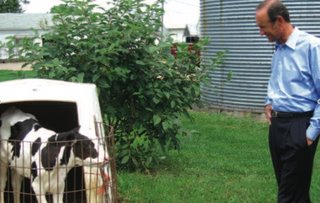Down on the farm with DeVos
 The people who selected and approved this image for dick's latest "TurnAround Plan" brochure ought to be relieved of their duties with the campaign. A photo of dick smiling at this calf like it's some kind of cute pet (but don't get too close!) speaks volumes about the man's agricultural expertise.
The people who selected and approved this image for dick's latest "TurnAround Plan" brochure ought to be relieved of their duties with the campaign. A photo of dick smiling at this calf like it's some kind of cute pet (but don't get too close!) speaks volumes about the man's agricultural expertise.Last week my regular email from the DeVos campaign brought "The Michigan TurnAround Plan Volume Two: Agriculture. "Agriculture?" you're asking. "Where's the plan for health care? Education? (other than what's covered in Volume One: Jobs)?" I know. I said the same thing. But go with me here and I might be able to shed a little light.
Before I get started, let me say that I know agriculture is an important force in our state's economy, as evidenced in part by a story in last week's GR Press about dairyman Timothy den Dulk. Den Dulk heads up of one of the country's largest and most influential agribusiness empires (the Press's word), and it's based right here in West Michigan. In 1995, den Dulk moved his corporate offices to Ravenna Township from California and has grown a business that includes 60,000 cows in 11 states, a farming publication, two milk cooperatives with over $600 million in annual sales, part ownership in a bank and a stake in a political action committee that is "partial to Republicans," according to the Press report.
What could prompt a move from the nation's biggest dairy producing state to the state that's number 8 in milk production? (source: www.nass.usda.gov) Maybe this?
Industry officials who know him said den Dulk's move was driven by economics and family ties in West Michigan. Also, California has tightened environmental regulations on large livestock farms in recent years and farmland there also is becoming scarce and more expensive.
And this?
DEQ Director Chester said some dairy and pork farmers are building large factory farms in the Midwest because the region's environmental regulations are relatively weak and there is a lot of affordable farmland.Then there's always this, to keep the business here:
The growth of den Dulk's agribusiness empire has been supported in part by government subsidies. Den Dulk was one of West Michigan's largest recipients of taxpayer-funded farm subsidies, receiving $820,363 in government subsidies between 1995 and 2004, according to federal data.Yet dick's brochure makes this claim:
As I’ve traveled throughout the state, people tell me the same thing – Michigan has too many regulations, and taxes are too high. And they are right – our state government’s excessive regulations have hurt our agriculture industry and hindered the ability of producers and processors to stay competitive in the international marketplace.And one of the ways a DeVos administration will address this? (emphasis added)
-snip-
The Michigan Department of Environmental Quality (DEQ) operates in a way that is often harmful to farms and threatening to our agricultural industry. I will get the DEQ to work with Michigan’s agriculture businesses, and not against them. I know that we can protect the environment and grow Michigan’s agriculture industry at the same time ...
Support pro-active, on farm, voluntary pollution prevention such as the Michigan Agriculture Environmental Assurance Program (MAEAP). My administration will provide incentive based, on-farm, technical assistance programs to ensure environmental stewardship. The top-down command and control regulatory approach currently used by the DEQ does not work for Michigan agriculture ...Ok, so it's heavy on the posturing and light substance -- something we've come to expect from this campaign. But I'm still bothered by the question: Why an entire campaign treatise devoted to agriculture, published on the heels of his jobs plan, seemingly giving the topic at least secondary importance in the list of things dick plans to turn
Yes, farming's big business in Michigan, but it doesn't even rate a mention in our state's Wikipedia entry alongside claims of our number 4 national ranking in high tech employment, number 3 in research & development investment and being the cradle of the domestic auto industry which claims to account for one of every 10 jobs in the U.S. Not to mention our booming life sciences sector and partnerships with two leading research institutions in MSU and the U of M. I think our Press article has the answer to this question, too:
Tim den Dulk contributed $3,550 to the 2004 congressional campaign of U.S. Rep. Pete Hoekstra, R-Holland. His wife, Marietta, contributed $10,000 in 2004 to GOPAC, the national Republican political action committee, making her one of that group's top 50 supporters nationally, according to federal campaign finance data compiled by the Center for Public Integrity.And there you have it. Yet another big money interest that's intent on maintaining the big business status quo. That's what we'll get from dick at every turn if he manages to wrest away the governor's seat. After all, as he says, he is a businessman.The two milk cooperatives den Dulk founded, and the Fair Oaks Dairy he co-owns, have contributed $97,100 to federal political candidates running for office this year. All but $9,611 of those contributions went to Republican candidates, federal data shows.
And businessmen have their priorities, don't they.

1 Comments:
Dick looks himself in the mirror.
Post a Comment
<< Home